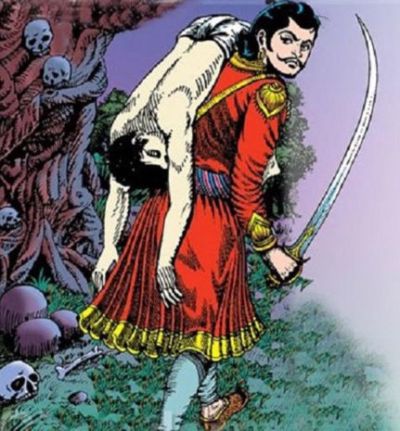“You should not have such doubts, and hesitate so much! I have to go, for my father’s sake, and I have to make the pilgrimage when I am young and able-bodied.”
“For who knows what will happen tomorrow, to this physical body that can die in a moment?”
“So let me go. I entrust the affairs of the kingdom to you, and you will have to take care of it until I am back.”

श्रुत्वैतं निश्चयं राज्ञस् तूष्णीम् आसत मन्त्रिणः ।
ततः प्रयणसंभारं सज्जीचक्रे स भूपतिः ॥ १२,२६.७२ ॥
अथाह्नि स शुभे स्नातो हुताग्निः पूजितद्विजः ।
सुयुक्तं रथम् आस्थाय प्रयतः शान्तवेषभृत् ॥ १२,२६.७३ ॥
सामन्तान् रजपुत्रांश् च पौराञ् जनपदान् अपि ।
निवर्त्यानिच्छतः कृच्छ्राद् आसीमान्तानुयायिनः ॥ १२,२६.७४ ॥
ब्राह्मणैर् वाहनारूढैः समं स सपुरोहितः ।
प्रतस्थे सचिवन्यस्तराज्यश् चन्द्रप्रभो नृपः ॥ १२,२६.७५ ॥
विचित्रवेषभाषादिविलोकनविनोदितः ।
पश्यन् नानाविधान् देशान् क्रमात् प्राप च जाह्नवीम् ॥ १२,२६.७६ ॥
ददर्श ता च जन्तूनां जलकल्लोलपङ्क्तिभिः ।
त्रिदिवारोहसोपानपद्धतिं सृजतीम् इव ॥ १२,२६.७७ ॥
हिमवत्प्रभवां शंभोः कृतक्रीडाकचग्रहाम् ।
बिभ्रतीं चाम्बिकालीलां देवर्षिगणवन्दिताम् ॥ १२,२६.७८ ॥
When the ministers heard their king speak in this manner, they understood his resolve and hence chose to remain silent. The king started to prepare for his journey.
On the auspicious Pūrnima, king Candraprabha rose very early, had a bath and then performed a yagna, following which he gave dānā to the Brāhmans of the kingdom.
He then donned the garb of a sanyāsi, and ascended his chariot, and commenced his journey.
This ministers, his soldiers and his subjects followed him closely, and when he reached the borders of his kingdom, the king found it very difficult to convince them to return.
Finally, he was able to make them stay back in the kingdom, and entrusting it’s affairs to the ministers, king Candraprabha set out on the pilgrimage with just his chief priest and a couple of Brāhmans.
The king crossed through many lands, and saw many cultures and peoples, heard many languages and tasted many different cuisines, before he reached the old Gangā.
It was a sight to behold. He stood still, mesmerized by the beauty of the river, that seems to, with the ridges of it’s waves, make a ladder for mortals to ascend to Swargā.
It seemed to imitate Ambikā, since it sprang from the Himavat mountains, and playfully pulled at the locks of Śiva…and was worshipped by the Rishis and the Gaṇas.
रथावतीर्णस् तस्यां च कृतस्नानो यथाविधि ।
चिक्षेपास्थीनि भूपस्य तस्य सूर्यप्रभस्य सः ॥ १२,२६.७९ ॥
दत्तदानः कृतश्राद्धो रथारूढस् ततो ऽपि च ।
प्रस्थितः क्रमशः प्राप प्रयागम् ऋषिसंस्तुतम् ॥ १२,२६.८० ॥
यत्रार्चिराद्यधूमादिम् आग्राव् इव समागतौ ।
गङ्गायमुनयोर् वाहौ भातः सुगतये नृणाम् ॥ १२,२६.८१ ॥
तत्रोपोष्य कृतस्नानदानश्राद्धादिसत्क्रियः ।
वाराणसीं जगामाथ स चन्द्रप्रभभूपतिः ॥ १२,२६.८२ ॥
एत मोक्षं प्रयातेति वदन्ताम् इव दूरतः ।
वाताक्षिप्तसमुत्क्षिप्तैः सुरसद्मध्वजांशुकैः ॥ १२,२६.८३ ॥
And so he descended from his chariot, took a dip in the Gangā, and then immersed his father’s ashes and bid farewell.
He then gave food and gifts to 1001 Brāhmans and performed the śrāddha. He then went back to his chariot, and set out from there, towards Prayāga, the holy city celebrated by the Rishis.
Here the Gangā and Yamunā met and shone for the welfare of men, like the line of flame and the line of smoke of the sacrificial ghee blending together.
In this city, King Candraprabha fasted and performed tapasya, distributed more of his wealth and fed more Brāhmans, and performed the śrāddha.
He then went to Vārāṇasī, which seemed by the silken flags of it’s temples, tossed about in the gusts of wind, to cry out from afar…
“Come here, and attain mokshā!”
to be continued…
